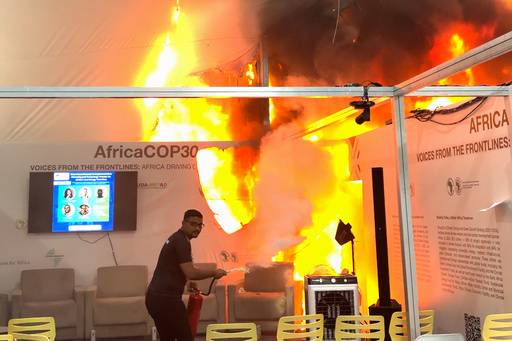Fire stalls final stretch of COP30 climate talks

BELEM, Brazil—A fire broke out and briefly spread through the pavilions being used here for UN climate talks on Thursday, as delegates from more than 190 countries entered the final hours of tense negotiations.
The fire triggered a chaotic evacuation that further stalled efforts to seal an agreement on climate finance, adaptation targets and the measures needed to keep global warming to 1.5 degrees Celsius.
At least 21 people were treated for smoke inhalation. There were no immediate reports of individuals sustaining burn injuries, according to a statement issued by the Brazilian Ministry of Health.
Organizers said the fire was controlled in about six minutes. Fire officials ordered the evacuation of the entire site for the conference, known as COP30, and it wasn’t clear when the talks would resume.
Video showed huge flames in one of the pavilions, which are reinforced canvas or fabric structures that typically have three walls and a floor.
Para state Gov. Helder Barbalho told local news outlet G1 that a generator failure or a short circuit in a booth may have started the fire.
‘World is watching Belem’
Earlier on Thursday, UN Secretary General Antonio Guterres appealed to all countries to “show willingness and flexibility to deliver results” at COP30.
“We are down to the wire, and the world is watching Belem. Communities on the front lines are watching too, counting flooded homes, failed harvests, lost livelihoods and asking how much more must we suffer? They have heard enough excuses. They demand results,” Guterres said at a press conference.
“After decades of denial and delay by many, science tells us that a temporary overshoot above 1.5 degrees, starting at the latest in the early 2030s, has become inevitable,” he said.
A key sticking point is the implementation of the 2015 Paris Agreement, which obliges rich countries to fund emissions cuts and adaptation measures in poorer countries, and to mobilize at least $300 billion per year with an overall climate financing target to reach at least $1.3 trillion by 2035.
The Adaptation Fund Report launched by the UN Environment Programme at COP30 estimated that the adaptation finance needs of developing countries could reach $310 to $365 billion per year by 3045. However, it noted that international funding from rich countries fell from $28 billion in 2022 to $26 billion in 2023.
For the Philippine negotiators and civil society groups, it was important to keep the negotiations going.
“We urgently need a global shift from higher ambition to stronger implementation. If we are to achieve transformative change grounded in justice and equity, we must not renegotiate principles, we must implement commitments,” said Environment Assistant Secretary Noralene Uy, who who heads the Philippine delegation.
The country remains committed to a climate action plan “that is anchored on fairness, equity and the principle of common but differentiated responsibilities,” Uy said.
PH poised to benefit, but . . .
While the Philippine government has yet to submit its updated plans, Uy said, it has pledged a 70-percent cut in emissions by 2030, covering energy, transport, forestry, industry and waste management.
The target is conditional or would depend on adequate finance, capacity building and technology transfer.
“Rich countries that have more resources should help countries that are suffering from the impacts of climate change so that we will be able to also cope and adapt to this crisis, especially the indigenous peoples,” said Joan Carling, Executive Director of the Indigenous Peoples Rights International.
The Philippine team at COP30 should keep pushing strongly for a loss and damage fund to address the inevitable impacts of climate change, including noneconomic losses, Carling said.
“The country is poised to benefit from the loss and damage fund. However, it must also hold itself to higher standards of accountability. If corruption persists, the funds intended to support vulnerable communities may never reach the people who need them most,’’ she added.
While more than $700 million has been pledged and received under the Fund for Responding to Loss and Damage, COP30 made way to operationalize the release of $250 million for proposals to support countries at the front lines of climate change.
Vicente Paolo Yu, who leads the negotiation on loss and damage for the G77 and China, said a top priority to scale up finance and ensure that the fund can be used rapidly, with all developing countries given direct access.
“That is our long-standing call. You need to increase the amount of money that is in the fund … But some developed countries are opposing it,’’ Yu said.
He stressed the need to send “a strong message on loss and damage to make sure that the knowledge and the funding to implement the technical assistance can address the needs of countries.”
More than 80 countries also demand a clear transition roadmap away from oil, gas and coal, a move backed by ministers and civic movements from Africa, Asia, Latin America, European Union, United Kingdom and the Pacific.
Avril De Torres, deputy executive director of the Center for Energy, Ecology and Development, recalled that a historic decision was made during COP28 in Dubai in 2023 to move away from fossil fuels and triple renewables globally.
But continued reliance on fossil fuels still drove power sector emissions to an all-time high in 2024, De Torres said.
“Global leaders at COP30 cannot turn a blind eye to this fact, not when every second that coal, gas and oil keep burning takes away from meeting the 1.5-C goal and the very survival of vulnerable people across the world,” she said. —WITH A REPORT FROM AP

















